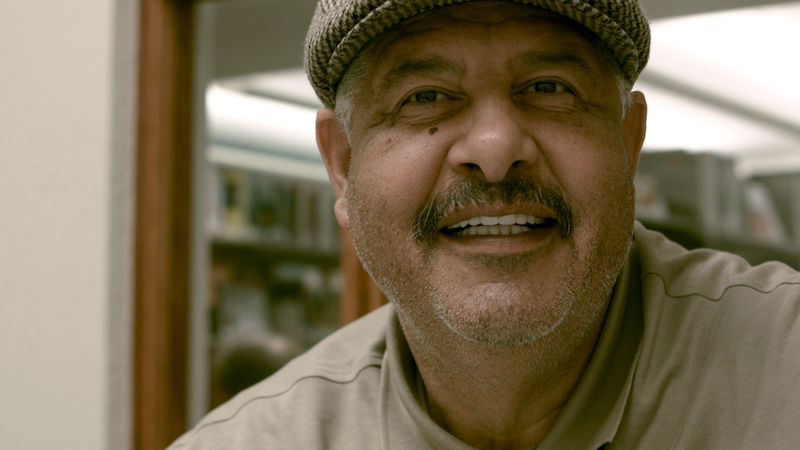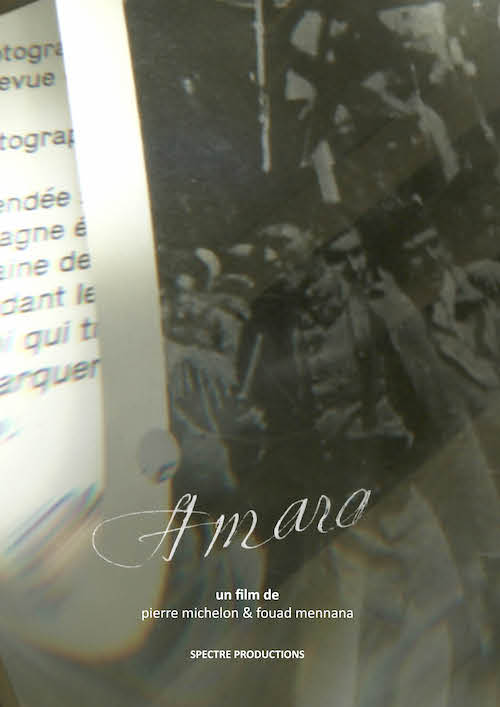Amara
-
Réalisé par Pierre Michelon • Écrit par Fouad Mennana, Pierre Michelon
-
France, Algérie, États-Unis • 2018 • 118 minutes • Couleur
- Réalisation :
Pierre Michelon - Écriture :
Fouad Mennana, Pierre Michelon - Image :
Pierre Michelon - Son :
Pierre Michelon - Montage :
Pierre Michelon
- Production (structure) :
Phantom - Coproduction :
Spectre Productions - Participation :
CNAP (Centre National des Arts Plastiques), Région Pays de la Loire, CNC, Région Pays de la Loire, Ville de Saint Laurent du Maroni - Ayant droit :
Phantom
- N° ISAN :
non renseigné
Résumé
Depuis le Colorado où il a élu domicile, Fouad Mennana entreprend de retrouver la trace de son défunt grand‑père — Amara Mennana — un agriculteur algérien exproprié de ses terres et déporté dans les bagnes de la Guyane française en 1926. Fouad lance sur internet quelques bouteilles à la mer. Mais rien n’est moins accessible que la violence du passé, et les archives et les classements et la poussière des cartons taisent secrètement l’histoire de celles et ceux qui n’ont plus de nom : sans nom patronyme, sans numéro, sans sépulture. Et pourtant, entre les paysages de cette disparition, entre Constantine et Saint Laurent du Maroni, entre Alger, Aix-en-Provence et les États-Unis, quelques lettres parviennent un jour à leur destination : "si je viens à être libéré, je regagnerai mon pays".
It is in a disorderly fashion that history winds its way to the present. Likewise, Amara takes the form of a Moibus ribbon, with neither beginning nor end. Moreover, temporalities overlap within the same image: on a shot that Pierre films in Fouad’s home, we see a message that marked the start of their correspondence some years earlier. We learn that Fouad’s grandfather, Amara Mennana, was transported to the penal colony in French Guiana for trying to steal a herd of goats in an Algeria that, at the time, was said to be French – probably for political reasons, although the exact circumstances remain unclear. Amara’s son soon lost track of him for good. Pierre and Fouad are both gripped by this story and begin searching in various institutions to finally uncover what happened to Amara. The archives unearthed and messages exchanged telling us about the inquiry’s progress are superimposed on landscapes filmed in Colorado, where Fouad lives, in Guiana, where Pierre goes, and in the place where everything began: Algeria. As his words resonate across these landscapes marked by colonisation, Amara wipes out for 110 minutes the gulfs that separate distant times and places, and weave a web that takes on a cosmic dimension through the presence of a timeless animal life. What’s more, places and animals are mentioned in the credits alongside human beings. The film appears as an archive for the future, which will bear witness to the friendship that was born one day between a Frenchman and an Algerian American united by the same obsession and a shared immersion in colonial horror.
(Olivia Cooper Hadjian)
Sélections et distinctions
- 2019 • Images en bibliothèques • Paris (France) • Film soutenu par la Commission nationale de sélection des médiathèques
- 2019 • Festival de Cinéma de Douarnenez - Gouel Ar Filmou • Douarnenez (France) • Sélection "Algériennes, Algériens"
- 2019 • Cinéma du réel • Paris (France) • Compétition française Longs métrages
Comment avoir accès au film ?
- Sortie en salle
-
Édition DVD
- Il n'existe pas d'édition DVD à notre connaissance
-
Accès VOD
- Il n'existe pas d'accès en VOD à notre connaissance
- Diffusion non commerciale / Consultation



